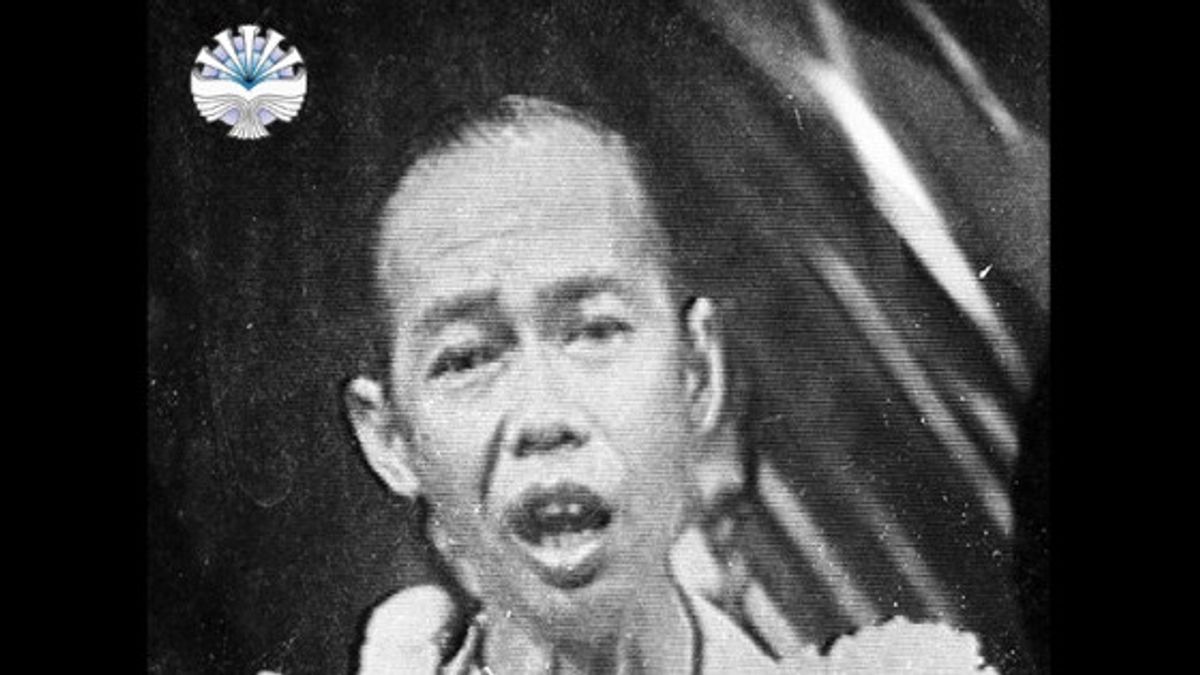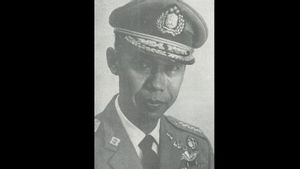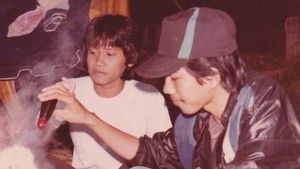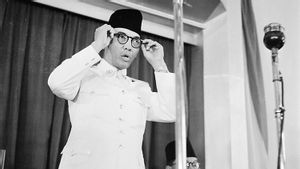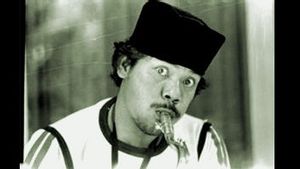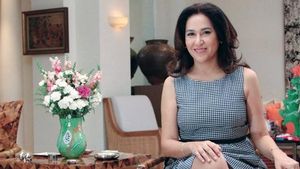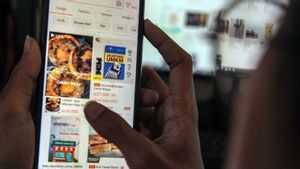JAKARTA - The story of General Hoegeng Imam Santoso is not only about honest police. He is also known as a brave policeman. His courage often angered corrupt officials of the New Order (Orba) era, even Suharto.
A series of major criminal cases have been revealed even though his position is threatened. Hoegeng is still brave. Even after quitting being the National Police Chief. He often criticizes the rulers of the regime, especially through the Petition 50 group.
Suharto responded to this criticism by "turning off" Hoegeng's steps openly. As the National Police Chief, Hoegeng Imam Santoso is known for his insistence on solving major criminal cases.
At that time General Hoegeng did not hesitate to examine government officials who were rumored to be involved in crimes. Including when solving the case of Robby Tjahyadi, the legend of a big-name luxury car smuggler who became one of the textile conglomerates in Indonesia.
However, for Hoegeng, the case is like any other case that must be investigated immediately. The case of Robby Tjahyadi was successfully solved by the Police. It was noted that in carrying out the smuggling, Robby Tjahyadi used a sophisticated modus operandi.
Robby Tjahyadi, who only graduated from high school, was able to smuggle 228 luxury cars into Indonesia. Even before that, there had been around 3,000 luxury cars that had managed to become smuggled. These include Alfa Romeo, Fiat, Quick, BMW, Mercedes Benz, Ford, Continental, Roll Royce, and so on.
“He was electrifying because of another factor. Although the core smuggling team consisted of only three people, the smuggling itself involved dozens of high-ranking officials in customs and the police. After this case was tried in a court involving 27 witnesses, Robby was sentenced to 10 years", said Ramadhan KH in his writing in Tempo Magazine entitled Dialah Polisi Teladan Kita (2014).

The straightness of Hoegeng's actions made the figure of the National Police Chief who came from a noble family as a media darling, someone who became a source of news. Not long after, Hoegeng then boasted promising reporters that there would be more big news.
By Hoegeng, the news was considered a surprise. Because the case that will be revealed by Hoegeng is a major case of dismantling luxury cars smuggling hundreds of millions of rupiah in Tanjung Priok.
But far from the roasted fire. Before he could announce the 'big news', Suharto was dismissed earlier by Hoegeng to make Hoegeng the Belgian Ambassador.
Even so, he had revealed to Suharto that if there was a vacancy to work in Indonesia, Hoegeng was ready to accept it. Whatever it is. Suharto said there were no more vacancies in the government. Hoegeng rejected the offer to work as an ambassador. He then chose to resign as Chief of National Police.
“For myself, the Robby smuggling case has a special meaning that I don't know about. It is said that as reported by the weekly Tempo, it was rumored that the Robby smuggling case was one of the reasons why I was disliked or fired as the National Police Chief".
"Logically, it is said, because I tried to dismantle the case earlier, long before the Coordinating Implementation Agency (Bakolak) led by Sutopo Juwono. Bakolak section of the eradication of smuggling, led by Attorney General Ali Said SH stepped in! But I don't know anything about that", Hoegeng said as quoted by Abrar Yusra and Ramadhan KH in the book Hoegeng: Polisi Idaman dan Kenyataan (1993)
Active criticism of Suharto

Although after his position as National Police Chief Hoegeng stepped away from power, it did not mean that he was silent when corruption was rampant. On the sidelines of his routine of singing and talking on Radio Elshinta during the Obrolan Mas Hoegeng show, The Singing General was actively criticizing Suharto.
The radio program even became Hoegeng's medium in giving constructive criticism to the New Order government. As a result, the program broadcast by Elshinta radio every Sunday morning, starting at 07.30–10.00 WIB, was flooded with listeners.
The criticism that Hoegeng brought in the Mas Hoegeng Chat event was fresh. Not because Hoegeng was a former National Police Chief, but because Hoegeng was too creative in packaging the actual subject matter combined with a pleasant language style.
Hoegeng recalls it: Say it was a conversation in the Capjay style, even though it was mixed up in Indonesian, regional dialects, Dutch, English, or German, but the taste was good and people digested it.
The main targets of his criticism, among others, focused on a series of officials in the New Order government who began to lose their identity and purpose in life. Because most of the officials' lifestyles are not by President Suharto's recommendation, which demands that officials live a simple life.
If left unchecked, the spree behavior of officials will threaten many things. This is not the first time that Hoegeng has been “sung” by Hoegeng. Long before he became the National Police Chief, Hoegeng often advised his secretary Soedharto Martopoespito when he was Minister of State Contributions.
Hoegeng always advised that as an official it is important to prioritize the truth over 'truth' (coincidence). Because if life is dishonest, then the official will threaten the sustainability of the life of the nation and state.
"Even so, Mas Dharto, don't be a person who always has the truth or coincidence but be a right person. Because, apart from being true for a moment, it also sometimes has a negative impact later on for that person. The truth is not necessarily the truth”, said Hoegeng as quoted by Suhartono in the book Hoegeng: Polisi dan Menteri Teladan (2013).
Hoegeng, who is enjoying retirement by entertaining the public through the musical group The Hawaiian Seniors, is getting louder. Through Hoegeng's song, he increased the intensity of his criticism. Because of that Hoegeng became part of the Constitutional Awareness Institute (LKB) formed by General AH Nasution and the former First Vice President of the Republic of Indonesia, Mohammad Hatta.
The institution was active in correcting the New Order which was considered to deviate from the ideals of independence. Not only that. When Suharto used Pancasila to threaten political opponents in 1980, Hoegeng immediately joined 50 other national figures to sign a statement condemning the New Order government under Suharto.
Hoegeng's presence as part of the 50 petition group further confirmed the opinion that Indonesia was not doing well. Other well-known figures from Petisi 50 are Ali Sadikin, General Abdul Harris Nasution, Akhmad Subarjo, Sabam Sirait, Mochtar Lubis, Chris Siner Key Timu, and Marsillam Simandjuntak.
New Order kills Hoegeng's steps
As a result, Suharto responded to this criticism by giving the title of the political enemy to all Petisi 50 figures. Suharto then imposed a "civil death sentence" without trial on the Petisi 50 group, including Hoegeng who often participated in the discussions of the Petisi 50 group at Ali Sadikin's house by rising Bajaj (three-wheeled motorized vehicle).
The forms of these “civil deaths”, some of which are none other than being banned from traveling abroad, isolated by mass media publications, not getting credit from banks, and others.
“Hoegeng, like all the signatories of Petition 50, faced this 'Civil Death Penalty' without a trial with a chivalrous attitude without complaint because he was fully aware that it was part of the logical consequences of the struggle to uphold truth, justice, honesty, and democracy,” said the story. Ali Sadikin in the book Hoegeng: Oase Menyejukkan di Tengah Perilaku Koruptif Para Pemimpin Bangsa (2009).

Moreover, Hoegeng had to accept the risk that his program on TVRI, Hawaiian Senior was terminated. Then, TVRI replaced it with a national music broadcast because Hawaiian music was considered foreign music.
In line with his program on TVRI, Obrolan Mas Hoegeng's program on Elshinta Radio began to be limited. In fact, before the signing of Petition 50, Hoegeng was still free to roam on television and radio.
“This 1952 PTIK alumnus prefers to be a free person, he appears with the Hawaiian Senior music group on TVRI, the only television channel at that time. But the western music with the flower garland was deemed to be incompatible with the "national personality" by the Minister of Information, Ali Moertopo, so he was not allowed to perform again", concluded Asvi Warman Adam in the book Menguak Misteri Sejarah (2010).
*Read other information about HISTORY or read other interesting articles from Detha Arya Tifada.
Other BERNAS
SEE ALSO:
The English, Chinese, Japanese, Arabic, and French versions are automatically generated by the AI. So there may still be inaccuracies in translating, please always see Indonesian as our main language. (system supported by DigitalSiber.id)
